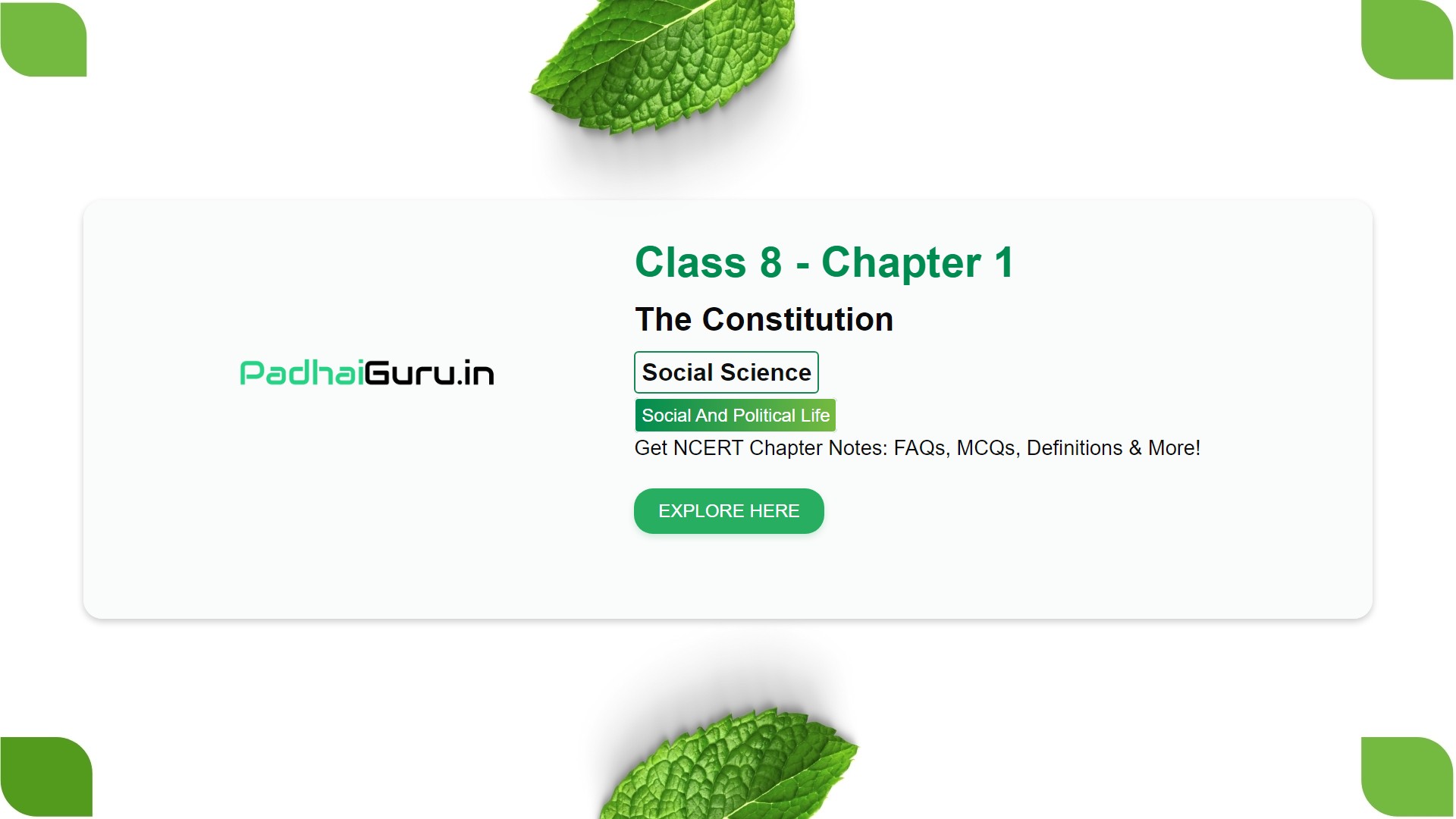01. The Constitution Political Science Class 8 Chapter 1 Notes

01. The Constitution Political Science Class 8 Chapter 1 Notes
Introduction to Chapter
This chapter explores the Indian Constitution, shedding light on its necessity, historical background, and key features that ensure democracy and justice in India. By understanding these foundational concepts, students can appreciate how the Constitution influences their daily lives and overall governance in India.: .,
Why Does a Country Need a Constitution?
A Constitution serves several essential purposes for a country. It is a set of rules that define the ideals upon which the country is built. The Constitution lays down the democratic principles of governance, ensures the protection of rights, and defines the powers of the government. It helps prevent misuse of authority and establishes guidelines for the functioning of democracy.
- Lays Down Ideals: Each Constitution reflects the aspirations of its people and sets the foundational principles for governance.
- Prevents Misuse of Power: It establishes checks and balances, ensuring that elected representatives do not exploit their authority.
- Protects Minority Rights: The Constitution safeguards the interests and rights of minority groups from majority rule.
- Guides Government Action: It acts as a framework that the government must adhere to when making decisions.
- Historical Context: It embodies the lessons learned from past struggles; for instance, India’s Constitution was influenced by the anti-colonial struggle.
- Promotes Equality and Justice: Ensures that all citizens are treated equally and have access to justice.
- Document of Consensus: Reflects the collective agreement of diverse communities within the nation on fundamental issues.
- Examples :
- The Indian Constitution was drafted after intense debates during India’s freedom struggle, emphasizing the equality of all individuals.
- In a classroom setting, rules help prevent bullying, ensuring every student is treated fairly, mirroring the Constitution’s role in society.,
Key Features of the Indian Constitution
The Indian Constitution is a well-structured document with critical features designed to maintain democracy and justice.
- Federalism:
- Refers to division of powers between central and state governments.
- Each level governs specific areas and has the authority to legislate and execute laws pertinent to their jurisdiction.
- Parliamentary Form of Government:
- Introduces representation through elected officials.
- Ensures that the government is accountable to the people.
- Separation of Powers:
- Divides responsibilities among legislative, executive, and judicial branches.
- Each branch checks the others to prevent any one from abusing its power.
- Fundamental Rights:
- Guarantees individual freedoms and protects against injustices by the state.
- Includes the Right to Equality, Freedom of Speech, and the Right Against Exploitation.
- Secularism:
- Ensures no particular religion is favored or promoted by the state.
- Allows freedom of religion while maintaining a neutral stance by the government.
- Examples :
- Federalism allows local governments to make decisions that suit their communities best, like education policies in different states.
- Fundamental Rights ensure that every citizen, regardless of background, has the right to fair treatment and opportunities.,
Conclusion
The chapter on the Indian Constitution educates students about the foundational principles that maintain democracy in India. Understanding these principles helps appreciate their rights and responsibilities as citizens and fosters national unity amidst diversity.: .
Keywords and Definitions:
- Constitution: A written set of fundamental principles by which a state is governed.
- Democracy: A system of government in which the populace elects representatives.
- Fundamental Rights: Basic human rights guaranteed to all citizens of India against discrimination.
- Federalism: Distribution of power between a central government and regional governments.
- Secularism: The principle of separating religion from governmental institutions.
